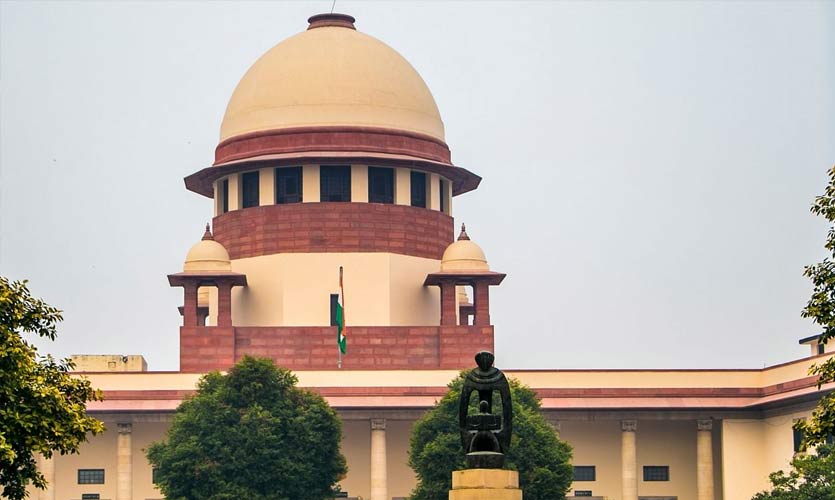The Supreme Court, on September 15, warned the Centre of initiating a case of contempt over appointments made to various tribunals across the country. This is the third time in less than three weeks that the apex court has admonished the central government over appointments in statutory tribunals. The Court questioned the Centre on why the appointments were made “after cherry-picking from the waitlists, instead of the persons actually recommended by the search-cum-selection committee”.
Citing large number of vacancies in tribunals, a Special Bench led by Chief Justice N.V. Ramana and comprising Justices D.Y. Chandrachud and L.N. Rao stated the matter as “pitiful”. The strong reaction from the court came following the government’s claim to have made 84 appointments since 2020 in majorly three different tribunals – the National Company Law Tribunal (NCLT), the Armed Forces Tribunal (AFT), and the Income Tax Appellate Tribunal (ITAT). In an affidavit filed on September 14, the Centre clarified that no recommendations on the appointment of members and chairpersons of tribunals are pending with it anymore.
The Court observed that the government has chosen to appoint only a few members from the list finalised by the search-cum-selection committee (SCSC). Defending the Centre, Attorney General K.K. Venugopal cited the Tribunal Reforms Act, 2021 and argued that the Centre has dominance over the appointments and is entitled to make choices.
Reacting at the Attorney General’s arguments, the Court noted that a “lot of effort” is being put to finalise the selected members and it is done basing on the inputs provided by the government. Stating that the selection procedure is a “waste of time”, the Court said, “What is the sanctity of the selection process, if the government has the last word? What is the purpose?”
The Court further questioned, “We spent weeks interviewing hundreds of candidates. Two Supreme Court judges and the finance and law secretary were part of the committee. So why to reject the candidate recommended?”
“We are very unhappy with the way things are going on and decisions are taken. There is a problem and everyone is aware of it. We gave the solution, which is appointments and it is for you to implement it. Without inviting orders from this court, if you can do something we will be happy,” noted CJI Ramana, adding, “We don’t know what type of appointment is this. It is against service law. How can you go to the waiting list without exhausting the final list?”
Justice Rao said, “We had a case last week from the Securities Appellate Tribunal and SEBI (Securities and Exchange Board of India) was before us. The matter in SAT was adjourned because there is no technical member in the SAT to hear the matter. There are only two members. The third is not there. You have to appoint technical matters. This is a practical problem.”
The top court further mentioned that its directive to the government in 2020, on setting up an independent body – the National Tribunal Commission – has also gone in vain. “The last time you said you agreed with us saying that the National Tribunals Commission on line of the UPSC could be created for appointments to tribunals. But it has been several days and we have not heard anything; the issue is very clear. It’s on you to implement. Everyone knows the solution,” observed the court.
The Court has given the Centre two weeks’ time to reconsider the recommendations in the final list of selections made. It stated that it would “hold its hands” on the contempt petitions until positive developments on the issue by the next hearing.
Read more: Centre Backs IT Rules, Says Will Prevent Misuse Of Freedom Of The Press
The Bench also told Attorney General Venugopal that the judicial members appointed in the NCLT were recommended two years back, and that judicial members only have a one year term in the NCLT. “As part of the SCSC for the NCLT, I interviewed 534 candidates for judicial post and 400 odd for technical. Out of that we chose 11 for judicial and 10 for technical. We travelled across the country for this. Despite all this, even during COVID, I agreed to hold online interviews for two days for more selections. But it seems to be a waste of time,” said CJI Ramana.
On September 6, a bench of judges led by the CJI, observed that the Centre has no respect for the judgments of the apex court and is “emasculating tribunals” by not filling up vacancies. “The government is bent upon not honouring the orders of this court… virtually the same Act is re-enacted. We cannot have this situation. Legislature can take away the basis of a judgment but you cannot overrule a judgment by re-enacting the very same provisions,” the Bench had informed Solicitor General Tushar Mehta who appeared on behalf of the Centre.
According to government data, it has cleared 338 names for different tribunals after the hearing, of which 18 members were appointed to the NCLT, one member to the Telecom Disputes and Settlement Appellate Tribunal, 13 members to the ITAT, and six members to the AFT.










